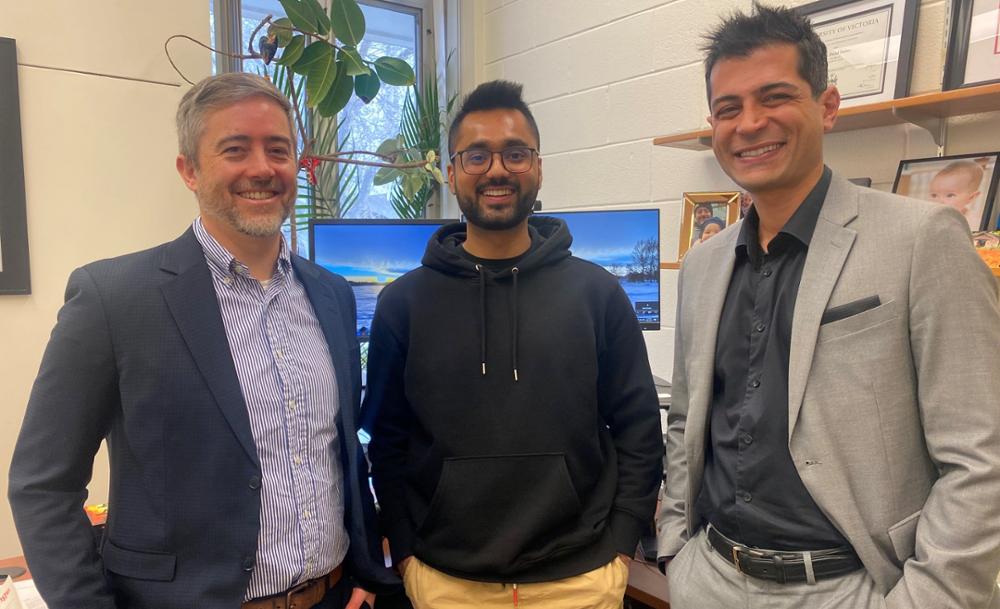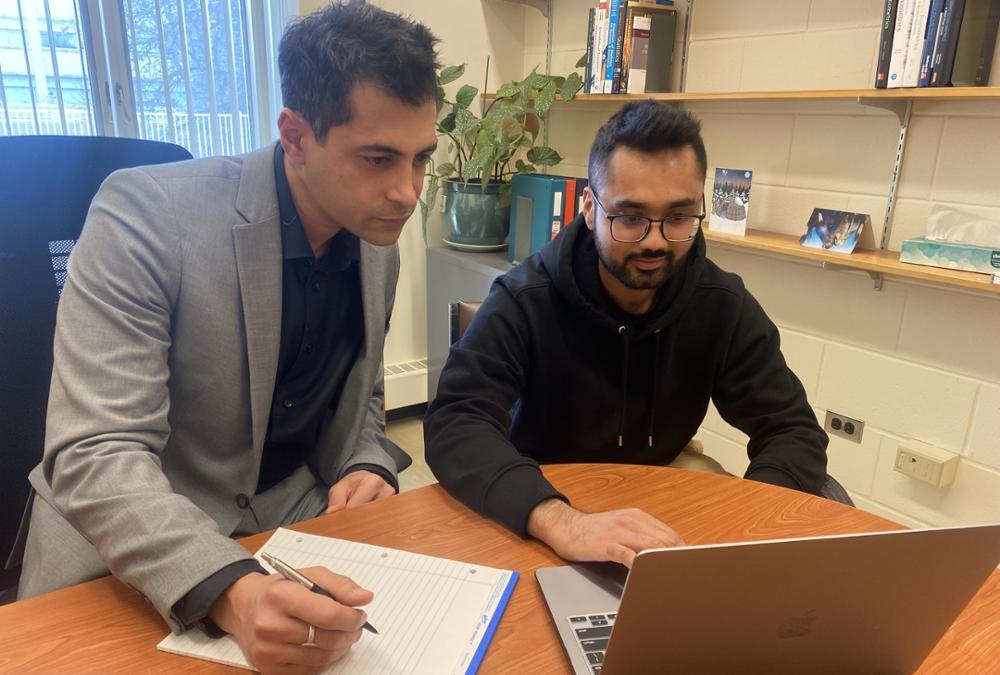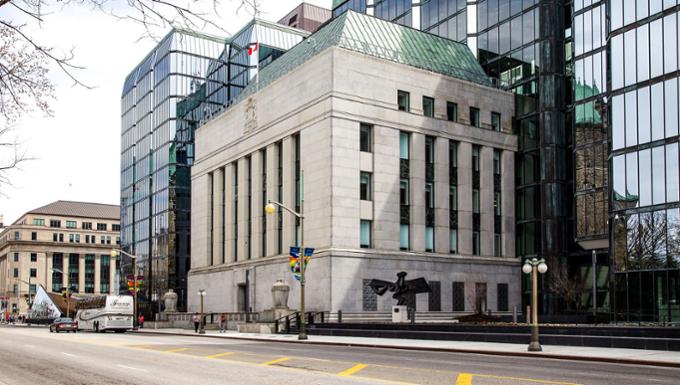Umair Munir can imagine himself boarding a plane bound for Ottawa almost immediately after he walks across the stage at the University of Regina Spring Convocation this June. When he graduates with a BA major in Economics and a minor in Computer Science with a GPA greater than 94 percent, he has a paid internship with the Bank of Canada waiting for him. It is by far the most prestigious economics internship in the country.
Munir says he could not have achieved this goal without mentorship from his professors, the hands-on learning opportunities afforded to him at the U of R, and hard work.
I was super excited and astonished to get the offer. I know there were over 800 applicants via LinkedIn alone and students from larger universities in Ontario, such as Western, U of T, and McGill, usually land the internship. The Bank of Canada is so imperative to the Canadian economy. I still can’t believe it. — Umair Munir, fourth-year Economics student
Munir says he thrived in the smaller program size and close-knit community. Professors from the department all knew him by name and were important mentors during his studies and internship application.
“I also had truly amazing opportunities to apply the skills and knowledge I gained from class to real-world economic issues through a major research project and UR Investing, the club that enables students to manage portfolios with investments on the actual stock exchange. My experiential learning experiences definitely helped me stand out during the interview process,” he adds.
Steep path to internship
Born and raised in Pakistan for the first 12 years of his life, Munir faced life challenges early on but has since flourished in his home city of Regina. After high school, he started at U of R as a Psychology major and then during the pandemic, he began to hear terms such as “economic downturn, dampened demand, and supply chain disruptions” in the news. His curiosity to better understand what was happening in the world led to him enrolling in Economics 100. After one class, he switched his major and entered a world governed by numbers – lots and lots of numbers.

In the fall of 2023, Munir attended a presentation delivered by Sharon Kozicki, Deputy Governor of the Bank of Canada, after his professor encouraged students to attend the event. He had lots of questions after listening to Dr. Kozicki speak about the household debt of Canadians and the Bank’s impact in everyday life so he worked up the courage and approached Dr. Kozicki for a discussion after her presentation. Seeing his passion, she told him he should apply for an internship with the Bank. Dr. Brett Dolter, U of R Assistant Professor in the Department of Economics, echoed the suggestion and offered to help Munir tailor his résumé and cover letter to fit the job description.
Rigorous application process
A month after applying, Munir received an email from the Bank of Canada confirming his interview and informing him that he would first need to complete a programming assessment over the course of one weekend. Thanks to a U of R 300-level Economics course, he had the programming skills needed to create the requested data sets by performing econometrics data analysis.
“I barely slept. They sent me the assignment in a PDF on the Friday and I came home from school and worked all night. I had never modeled inflation, but knew the programming language R so had a solid foundation. I was really passionate about having this opportunity, so put a lot of thought and care into my submission,” emphasizes Munir.

The assignment hit the mark because six different departments of the Bank requested an interview with him. The details were set for back-to-back virtual interviews the following month. During the interviews, Munir says he felt intimidated, but that the interviewees were kind and assured him that the size of the program did not determine if he would get an internship. He then waited. And waited. In late November, he received the exciting phone call and offer.
“I was super excited and astonished to get the offer. I know there were over 800 applicants via LinkedIn alone and students from larger universities in Ontario such as Western, U of T, and McGill usually land the internship. The Bank of Canada is so imperative to the Canadian economy. I still can’t believe it,” he gushes.

A paycheque, the excitement of living in Canada’s capital, and an official title of Research Assistant in the Department of Financial Stability are a few months away. The role involves helping inform decisions related to Canada’s inflation rate by supporting senior researchers with data analytics, ensuring the models are up to date and optimized for the current environment. Munir was told to expect to present his work to other departments of the Bank, as well as the Governing Council.
Experiential learning in economics
Munir’s impressive application was supported by more than his high grades. He was also the recipient of multiple awards and scholarships available to Economics students at the U of R, including the Dr. Peter Woroby Memorial Scholarship in Economics, Academic Silver Scholarship, and the Faculty of Graduate Studies and Research (FGSR) Undergraduate Research Award. The FGSR research award paved the way for him to provide research support to one of his professors, U of R Assistant Professor of Economics Dr. Omid Mirzaei.
Mirzaei’s research examined factors affecting the transportation expenditures of First Nations households in rural Alberta. With his economics prowess, Munir analyzed the data sets to determine how factors including household size, income, location, employment status, etc. affected transportation costs. And, in a rare accomplishment for undergrad students, Munir will be acknowledged as the lead author.

“Umair is an exceptional student who fully commits himself to whatever goal or task he wants to achieve. I knew he was capable, so I offered him the opportunity to be the lead author, as well. He jumped at the opportunity and went above and beyond,” beams Dr. Mirzaei.
For his extra-curricular pursuit, Munir joined UR Investing, a student-managed portfolio through the U of R Faculty of Business which invests more than $2 million in Canadian and U.S. equities, Fixed Incomes, and Real Estate Investment Trusts (REITs). He wrote stock reports every semester on firms in the portfolios he was managing and in the 2023-24 academic year, he took on the role of President for the mini-corporation.
“The UR Investing club heavily impacted my successful application. During my interviews, I was able to talk about the leadership, time management, interpersonal, and team work skills I gained from the experience, not to mention the financial management experience,” he adds.
Munir climbed the ladder at UR Investing and will no doubt climb the ladder at the Bank of Canada or anywhere he decides to go.
Economics less known but lucrative
Economics is a smart choice when it comes to undergrad studies for many reasons, suggests Dr. Monika Çule, U of R Economics Department head.
“When you ask children what they want to be when they grow up, you likely won’t hear them say, ‘I want to be an Economist,’ but a degree in Economics opens many doors and leads to fulfilling and high-income earning careers. It’s a clear finding in studies using data on university majors and lifetime earnings,” shares Çule.
See a future for yourself in Economics? Explore your options at the U of R.
Like Munir, many students declare their Economics major after one or two years of study. The U of R has a robust list of course offerings and program options for undergraduate certificates, and BA and BSC majors in Economics. Çule says Economics is a way of thinking that develops valuable skills that are in high demand and lead to jobs such as a Policy Analyst, Financial Analyst, and Development Specialist in public, private, and not-for-profit sectors.
For Munir, the degree has opened several doors already, including to new life and career experiences in Ontario, a province he will soon visit for the first time. Rest assured, says Munir, he will never forget the guidance, support, and opportunities offered to him by the University of Regina.
Banner photo: Bank of Canada head office in downtown Ottawa. Credit: Bank of Canada.
About the University of Regina
2024 marks our 50th anniversary as an independent University (although our roots as Regina College date back more than a century!). As we celebrate our past, we work towards a future that is as limitless as the prairie horizon. We support the health and well-being of our 16,700 students and provide them with hands-on learning opportunities to develop career-ready graduates. Our research enterprise has grown to include 21 research centres and 12 Canada Research Chairs and brings in more than $51.2 million in funding annually. Our campuses are on Treaties 4 and 6 - the territories of the nêhiyawak, Anihšināpēk, Dakota, Lakota, and Nakoda peoples, and the homeland of the Michif/Métis nation. We seek to grow our relationships with Indigenous communities to build a more inclusive future.
Let’s go far, together.
